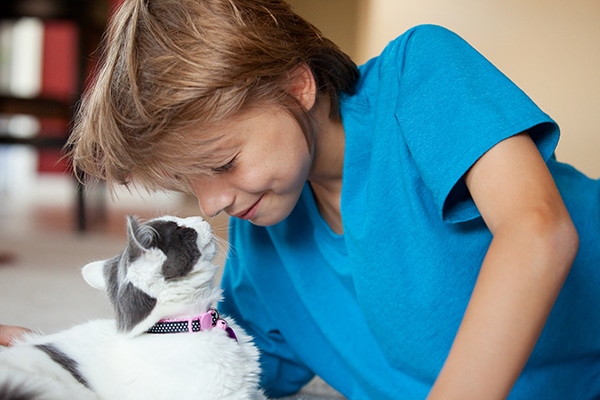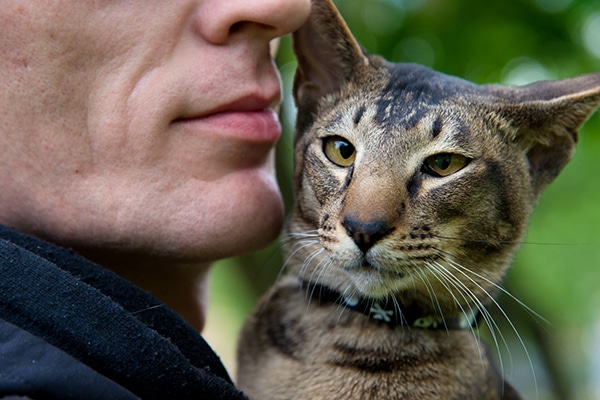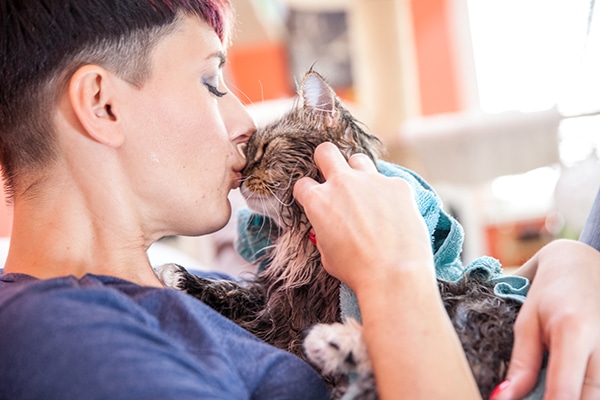Watching cats is a window into a most mysterious world. My household is always abuzz with my cats’ antics. It’s often loud with the smashing and crashing of rambunctious play — there goes a vase! I knew I should have moved the lamp. But during their quieter moments is when things get really interesting. My two big toms walk around the house rubbing their faces on doorways, the corner of the couch, coffee table legs and seemingly every item they can reach. They especially take delight in rubbing their faces against my patient senior dog. This cat face rubbing also extends to me. My hands when I’m writing, my face when we’re chilling and my feet when I’m in bed. So, let’s find out — why do cats rub their faces on you and what’s the difference between rubbing their faces on your face and the end table?

Cat face rubbing means scent marking. Photography ©sdominick | E+ / Getty Images.
1. Cats rub their faces on you for scent marking.
When it comes to the question, “Why do cats rub their faces on you,” let’s get one thing straight — cats are not rubbing their faces on things because they are itchy. According to Dr. Stephanie Borns-Weil, DVM, in the Tufts University, Cummings School of Veterinary Medicine blog, the cats are using the glands in their faces to leave scent markings. She explains that there are glands in their chins, ears, sides and necks. These glands are activated when cats rub their faces on objects. This behavior is called headbutting or bunting and it’s a form of cat communication.
Dr. Nicholas Dodman, BVMS, Professor Emeritus at the Cummings School of Veterinary Medicine, echoes this sentiment in his article, The Art of Bunting. He states that cats are communicating to other cats when they leave a scent mark via rubbing that contains feline facial pheromones. Essentially, the cats are marking objects with a scent that lets other cats know they were here. In case anyone was wondering. It’s part of claiming their territory — and their territory extends to you! Or does it?
2. Cat face rubbing all started in the wild.
Cats in the wild needed to communicate to survive. In the book, Neurobiology of Chemical Communication by Mousumi Poddar-Sarkar and Ratan Lal Brahmachary, the authors state that the subject of chemical signaling, with pheromones being one aspect, is wide ranging in big cats. It’s believed the head bunting phenomenon evolved to help cats attract mates. When leaving a pheromone calling card, the cat is saying, “Smell my superior virility!” It’s also reported that big cats often have overlapping territories, so it could also be saying, “I’m a big boy, don’t mess with me.”
The scientific report, Comparative Analysis of the Domestic Cat Genome Reveals Genetic Signatures Underlying Feline Biology and Domestication, states there is strong evidence supporting the magnitude of cats’ reliance on pheromones for sociochemical communication. Which makes sense, since many big cats have territories that butt up to each other and sometimes overlap. What’s going on with each member of the terrain could mean the difference between life and death. Your cat rubbing his face on surfaces is rooted in some serious survival tactics!
Christian Nordqvist explains in an article from Medical News Today that pheromones act as behavior-altering agents. And it’s not just sexual (although the tigers in love with Calvin Klein’s Obsession for Men may disagree). The behaviors they can trigger include: bonding, alarm, “the food’s this way,” stay away and sexual arousal. That’s a lot of lifesaving information if you’re a cat navigating Neolithic landscapes.

Cats rub their faces to show affection. Photography ©Vasilisa_k | iStock / Getty Images Plus.
3. Cats rub their faces to show their affection.
While your cats are busy rubbing their faces on the inanimate objects of your home with the purpose of declaring it their property, are they really counting you as part of the inventory? There are plenty of elusive ways that cats show their affection. To the untrained eye, a lot of cat behaviors seem quirky. However, a lot of their actions are their way of displaying how much they love you. Cats actually rub their faces on you as a way of showing their love. It’s a confusing love message, but it is a message indeed.
Pam Johnson-Bennett, cat behaviorist and author, states in her blog, Cat Behavior Associates, that bunting behavior is exclusive with bonding, socializing and comforting. When your cat rubs his face on you, he’s scenting you with affection. Cats will also headbutt each other. She further explains that cat headbutting or bunting is also used to seek attention. If your cat hits you with his head and then turns it down and to the side, he could be asking for a scratch about the ears, neck and face. And there’s a good reason for that — when massaging and scratching around that area you are helping to release endorphins.
The fact is, the more your cat rubs his face on you, the more he’s telling you that he loves you. Every cat face rub translates to less of “Be Mine,” and more of “You’re Mine!”
Tell us: Does your cat rub his face on you?
Top photograph: Photography ©CasarsaGuru | E+ / Getty Images.
Read Next: Why Do Cats Knead? Explaining Cat Kneading, a Quirky Cat Behavior
